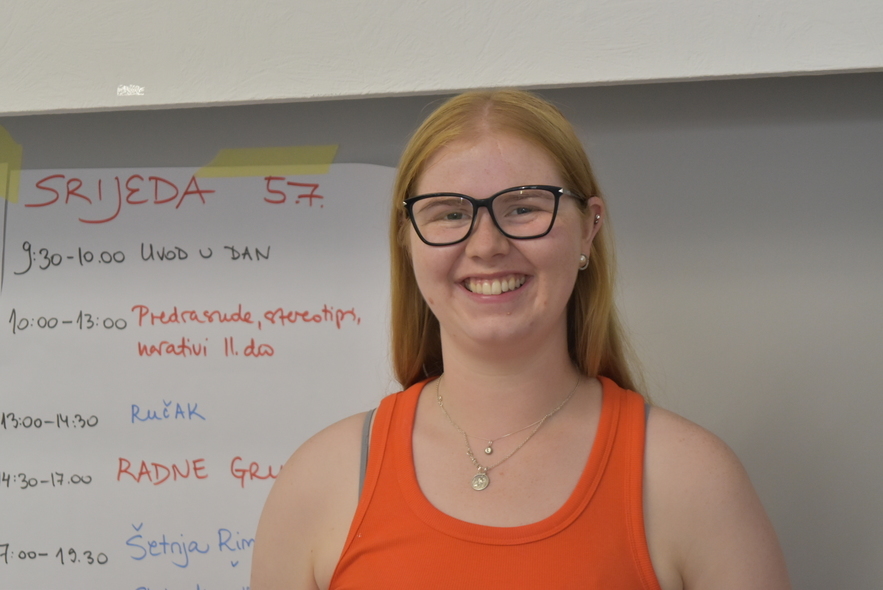Zagreb, October 2, 2023
Over the course of June/July I was lucky enough to work with the excellent people at Youth
Initiative for Human Rights Croatia, as an ICSC intern. My experience at YIHR has been
incredibly rewarding and being able to see the actions and programmes undertaken by
NGOs has provided me with a much greater understanding of the importance of their work.
I set out with a few tasks to complete, the main one being a glossary filled with concepts in
the world of transitional justice, for a publication next year. Despite being familiar with
transitional justice, researching it further allowed me to appreciate the need and critical
nature of the concept. Initially I felt as though transitional justice was one of these terms
that often people who don’t really know much about it throw around without further
explanation. Moreover, when you google “Transitional Justice” there are varying definitions
from very different NGOs and supranational organisations. It’s also an incredibly
multifaceted approach and the contextualised nature means that each country that
undergoes a process of transitional justice will use different programmes and reforms. It
quickly becomes apparent as to why the glossary was needed. We ended up with nineteen
concepts, all defined using available literature and with examples and further reading
suggestions. My hope is that this glossary will be a vital part of the tool book publication,
aiding political youth in their learning and enabling them to understand concepts that
perhaps weren’t the easiest to come to terms with.
Attending the Daruvar summer school was a particular highlight of my time with YIHR. I was
able to meet, and speak with, young people interested in transitional justice and human
rights from across Croatia and Serbia. Their willingness to learn and openness to debate with
each other was inspiring. The group was incredibly accepting and shared with me their
opinions and beliefs of the narratives surrounding the conflict of the 1990’s. Prior to
discussing the conflict with the group I had so many unanswered questions and I struggled
to understand the different intersections of religion, ethnic identity and national identity
within the conflict. Over coffee (and a little wine) I began to understand the complex nature
of the identity aspect and how the violence was so specific and brutal. The four days in
Daruvar were hugely rewarding.
Once back in Zagreb my focus shifted towards the anniversary of Operation Oluja. In
preparation for preparing social media posts I did extensive research, watching the ICTY
trials, interviews with soldiers and with victims and archival footage. I also read a great deal
and was able to apprehend the extent of ethnic cleansing that occurred. Watching the ICTY
trials in particular allowed me to enter a new world, witnessing soldiers try to excuse their
behaviours or blame it on other things was shocking. What also struck me was the difference
in the narratives that surround Oluja in terms of Croatian and Serbian perspectives. Although
perhaps what I found most odd was the recreation of refugees fleeing in 2020 for the 25th
anniversary of the operation. Seeing and understanding where the term ‘ethnic cleansing’
comes from has shifted my mentality, I was passionate about human rights before but the
conflict of the 1990s, and specifically Oluja, has reinforced my passion for human rights and
the need for human rights education.
My last task perfectly wrapped up my time at YIHR. Tasked with presenting a webinar to the
political youth network, I was able to use everything I had learnt over the past four weeks.
Leading a discussion of transitional justice and how regional cooperation, particularly at
youth level, is critical for healing in post-conflict societies. It was also fantastic to see activists
from Daruvar continuing to engage in political, human rights activity.
YIHR provided me with an opportunity to learn and explore the world of transitional justice
in an incredibly supportive environment. Their work is vital. NGOs, particularly international
justice societies occupy positions of importance. They are needed, offering different
narratives and opportunities to understand conflict away from official, often times
inaccurate, state narratives. They encourage society, particular youth, to get involved and
engage with the healing process, further aiding the healing of the nation. What I see at YIHR
Croatia is a team of passionate activists who work fearlessly to help their society, promoting
peace and justice, one initiative at a time. I am immensely grateful to have worked alongside
them.
This text was written by Eve Jones, our intern from Great Britain.
Project MLAD! is implemented with the financing of the Central State Office for Demography and Youth.
This text was created with the financial support of the Central State Office for Demography and Youth. The content of this text is the sole responsibility of the author and under no circumstances can it be considered as a reflection of the position of the Central State Office.
